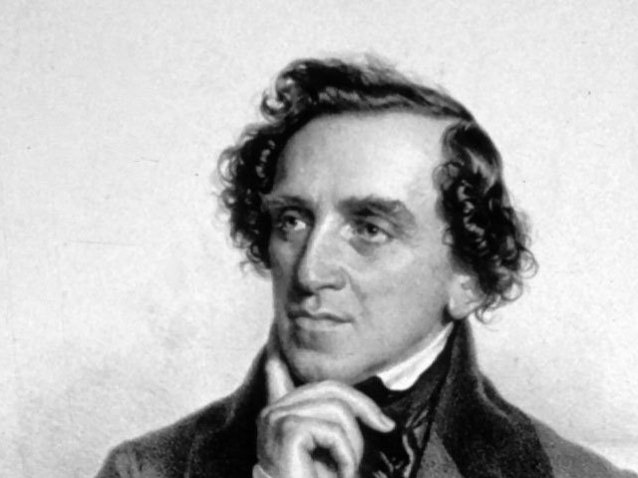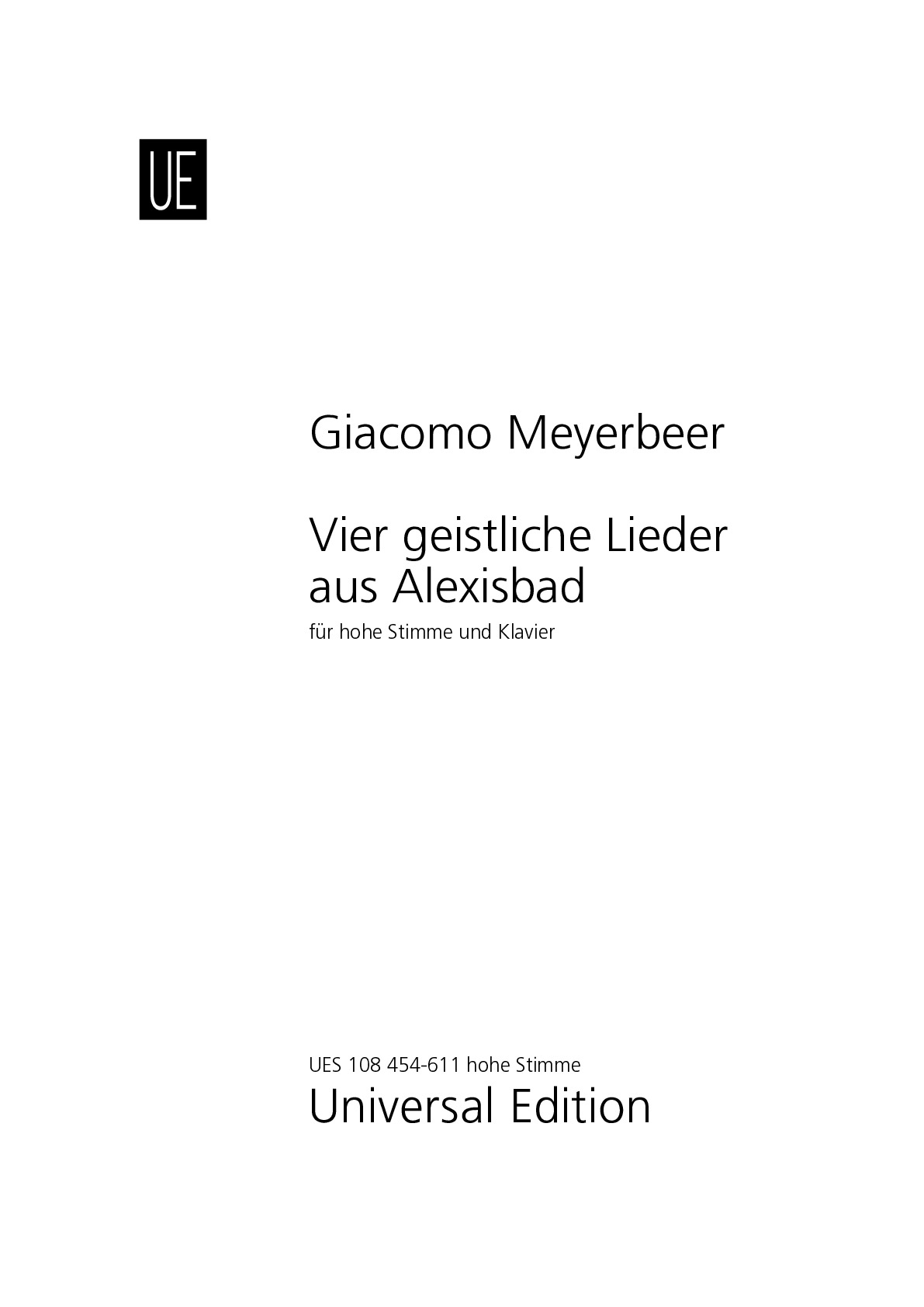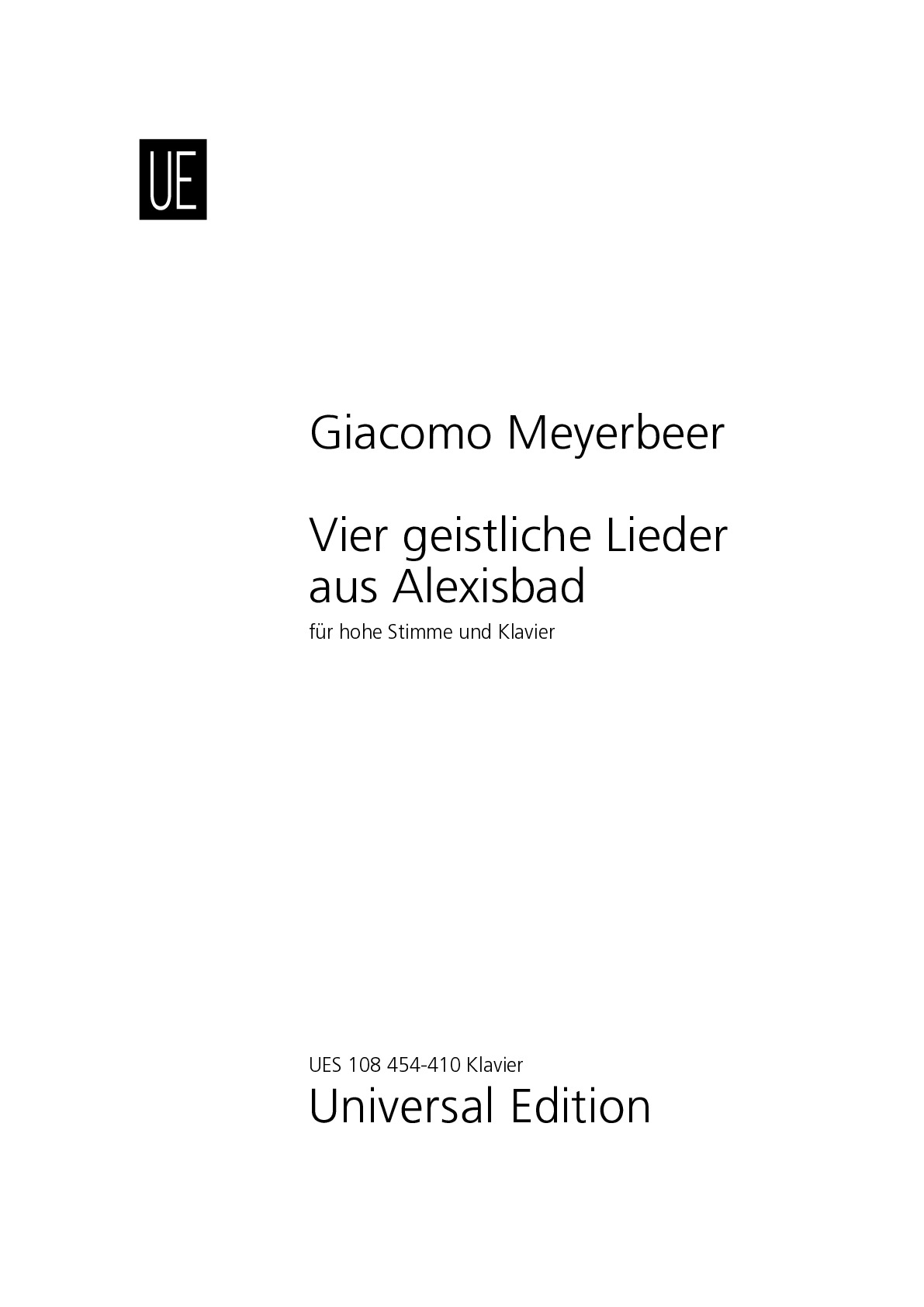

Giacomo Meyerbeer
Four Sacred Songs from Alexisbad
Duration: 10'
Solos:
piano
high voice
Four Sacred Songs from Alexisbad
Translation, reprints and more

Giacomo Meyerbeer
Hohe Stimme (Vier geistliche Lieder aus Alexisbad)Type: Solostimme(n)

Giacomo Meyerbeer
Vier geistliche Lieder aus AlexisbadType: Noten
Sample pages
Work introduction
Giacomo Meyerbeer’s forgotten treasures
Edited by musicians for musicians
Director: Andrea Chudak
Four Sacred Songs from Alexisbad
Giacomo Meyerbeer arrived in Alexisbad (Harz) on September 24, 1841. According to his diaries, a concert in honor of the composers Felix Mendelssohn and himself was planned in Berlin during this period. As Meyerbeer disliked “honorary” events of this kind and avoided them whenever possible, he “fled” to the spa town of Alexisbad without further delay in order to cure his ailing health and work there. In addition to his operatic work, he also devoted himself to composing sacred songs. Although they were not necessarily conceived as a cycle, we have grouped four of them together in this edition as “Vier geistliche Lieder aus Alexisbad”. Unfortunately, a fifth song is still missing - should it be found in the future, we will include it in a new edition.
Meyerbeer composed the “Sonntagslied” (Sunday Song) after a poem by Hermann Kletke (1813-1886) on September 26, 1841 (actually on a Sunday, incidentally one day after the highest Jewish holiday Yom Kippur). The diary also draws attention to the fact that there was no piano available for composing in the room. On Tuesday, September 28, 1841, he composed the songs “Gebet am Donnerstag Morgen” (Prayer on Thursday morning) to a text by Henriette Gottschalk (1774-1809) and “Alles in einem” (All in one) (text by Albert Knapp) - the latter work is unfortunately still missing. On October 2, he composed „Gottesergebenheit“ (Devotion to God) to a text by Siegfried August Mahlmann (1771-1826), followed a day later by “Luft von Morgen” (Air of Tomorrow) to a text by Albert Knapp (1798-1864).
The “Luft von Morgen” appeared in a musical album in Leipzig. The “Gebet am Donnerstag Morgen” and “Gottergebenheit” were published in a supplement to the “Wiener musikalische Zeitung”(Viennese Musical Newspaper), whereby the first of the two songs was initially given the title “Geistliches Lied” (Spiritual Song), later also “Reue” (Remorse) - which meant that Meyerbeer researchers in the 20th century were able to find the songs again, but were unable to attribute them and the song with the title “Gebet am Donnerstag Morgen” was still considered lost until 2022. The first printings of “Sonntagslied” and “Alles in einem” are unclear.
The sources for the present edition are various printings, including later ones, which have been compared with each other.
What is interesting about Meyerbeer's concept of these sacred songs is that they reflect relatively unspecific, cross-religious themes as in “Gottergebenheit”, security in prayer and existential devotion to God and creation. The “Remorse” text of the “Gebets am Donnerstag Morgen” may even contain an echo of the religious Yom Kippur motif of repentance and conversion; after all, the highest Jewish holiday was only a few days away at the time of composition. In “Sonntagslied”, one could speculate as to whether there could also be allusions to Jewish Shabbath holiness here; the motif of the angel could also support this, even if not very specifically. In the motif of the “heavenly air” in “Luft von Morgen”, one senses a certain proximity to pantheistic attitudes, as can also be found in the poetry of Johann Wolfgang von Goethe (highly respected in Jewish circles at the time). It is clear that Meyerbeer, as an enlightened Jew and free spirit, creates universally valid statements here within the framework of a general human attitude, beyond denominations - and in a unique, personal emotional language.
(English translation: Joseph Schnurr)
